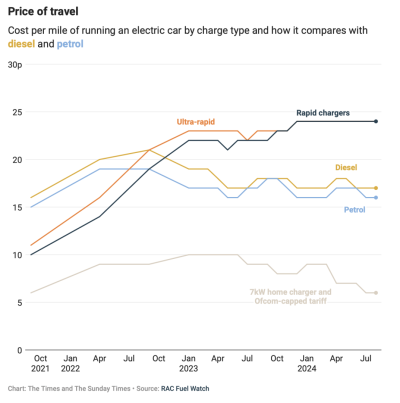Does anyone have a membership for The Times to read the actual article that Tge Express article is based upon?
Motorists without space at home to charge their cars are facing prohibitively high costs at public facilities

www.thetimes.com
Lazy journalism quoting another news outlet. Lots of them do it.
It would be interesting to know whether this comment related to BEV as implied by The Express or the market as a whole.
Britain’s public charging network is so expensive that the cost of driving an electric car is now up to twice the price of running a petrol or diesel vehicle.
The UK has more than 12,500 rapid or ultra-rapid charging stations — a 40 per cent increase on a year ago — but data shared with The Times shows they cost an average of 80p per kilowatt hour (kWh), making the switch to electric cars prohibitively expensive for motorists who do not have access to cheaper at-home charging.
Prices at rapid chargers have increased 5 per cent over the past year, according to ZapMap, which supplied the data. Over the same period, the wholesale cost of electricity has fallen by 30 per cent.
Public chargers are defined as rapid if they deliver at least 50 kW of power, allowing a battery to fully recharge in about 30 minutes. However, the data shows that even those who
choose slower public chargers are still paying more per mile than petrol and diesel drivers, following recent falls in the cost of oil.
Industry leaders have raised concerns that the cost of public chargers, as well as the higher cost of electric vehicles, is delaying the transition to greener motoring.
The Office for Zero Emission Vehicles is the key body within the Department of Transport that creates and monitors policies on public chargers. The government has outlined no plans to regulate the price of electric chargers.
However, the latest figures show that sales of electric cars have stagnated, accounting for just 17.2 per cent of all new registrations so far this year, down from a high of 18.7 per cent in the second half of 2022.
In Europe, sales of electric cars are performing even worse, with registrations down 44 per cent in August alone.
Mike Hawes, the chief executive of the Society of Motor Manufacturers, said: “It is tough out there. Levels of demand are much, much softer.”
While electric cars are significantly more efficient and less polluting than petrol or diesel vehicles, the high cost of chargers — and the falling price of oil — can make going green an expensive choice for those who do not have access to charging at home.
The average electric car travels 3.3 miles for every kWh of electricity used, meaning rapid and ultra-rapid chargers currently cost the equivalent of 24.1p per mile while slower chargers cost 16.4p per mile.
However, the average diesel travels 43 miles per gallon, meaning a cost of 12.5p per mile at current forecourt prices. The average petrol car costs 14.5p a mile.

This means a return journey from London to Penzance would cost £148 in an electric car using rapid chargers, compared with £77 in a diesel car and £89 using petrol.
However, at-home charging works out much cheaper. The current price of electricity under the regulator’s cap is 22.4p per kWh, less than a third the average rapid charger.
This means that charging at home costs 7.8p per mile. Homeowners who have a smart meter can take advantage of even cheaper off-peak electricity and charge their cars for even less. The cheapest night-time electricity rate — known as Economy 7 because it operates for seven hours between midnight and 7am — charges just 6.7p per kWh, meaning a cost of just 2p per mile.
The problem is that nearly half of Britain’s households live in flats or terraced properties, meaning most have no driveway or garage to allow at-home charging. In Britain’s biggest cities, three quarters of households live in flats or terraced homes.
Running a cable across the pavement to charge a car from a terraced home, even with a cable protector, is not permitted under the Highways Act because it may present a hazard or an obstruction. Some councils say residents who charge their cars this way could be fined and be liable for any accidents they cause.
The AA says the cost of rapid charging is a factor in why the take-up of electric cars has stagnated, along with the extra cost of buying the cars in the first place.
The motoring organisation, along with several other industry groups, believes one of the answers is for the government to synchronise the level of VAT on chargers with the rate levied on at-home power. Domestic electricity has a VAT rate of 5 per cent whereas chargers outside the home face the normal rate of 20 per cent.
Thom Groot, founder of the Electric Car Scheme, said: “We need to keep stimulating demand with incentives and supporting consumers in making the switch. The fact that people who charge at home pay less VAT than those who use public chargers is unfair.”
The Society of Motor Manufacturers also wants the government to look at cutting VAT on electric car sales or exempting electric vehicles from the new “luxury car supplement”, which will add a higher rate of road tax to about two thirds of electric cars because they cost more than £40,000.
It estimates that halving the VAT rate on sales would boost the number of electric cars sold by a quarter of a million vehicles a year.
Some councils are also looking at making charging at home easier, by allowing homeowners to apply to have a channel installed in the pavement outside their homes for a cable to run along. But the cost is likely to be high and a deterrent to many.
Many in the motoring industry believe that without a transformation in the cost of electric motoring — either through cheaper vehicles or more widespread access to cheaper charging — there is little hope that car makers will be able to
meet government targets on the number of electric cars they must sell.
Under the zero-emission vehicle mandate, 22 per cent of car sales this year must be electric vehicles. This rises to 28 per cent next year, and increases incrementally until 80 per cent of all sales must be electric by 2030.
Car makers that fail to meet the target face fines of £15,000 per diesel or petrol vehicle they sell, although they can avoid the fines by buying credits from fully-electric car makers, such as Tesla, or those who have exceeded the target.
Labour has pledged to ban the sale of all petrol and diesel cars by 2030, meaning that the remaining 20 per cent are likely to be hybrid cars, which are part-electric but also have a fuel motor.
Research published this week by Auto Trader illustrates the scale of the challenge facing the industry. It found that the average electric car costs nearly a third more than the equivalent petrol or diesel model, but nine in ten buyers say they will not pay more for an electric vehicle.
Jamie Caple, the boss of Car Quay, an independent used-car dealership near Derby, said selling electric cars was stressful and would often backfire.
“I’ve lost money, had customers asking for their money back because of range issues and ended up in battles with manufacturers over the claimed range versus the real-world battery life,” he said. “And they are hard to sell.”
Cape said that as well as the extra costs, Rishi Sunak’s government
delaying a ban on petrol and diesel cars until 2035 had also been a problem.
He said: “The government flip-flopping has been a big one. When the last government pushed it back to 2035, people definitely thought ‘I can delay getting an EV’, and pushed back making the switch.”
Hugh Bladon, the chairman of the Alliance of British Drivers, believes the government will ultimately have to give up banning petrol and diesel sales.
He said: “This is for several reasons, not the least of which is the sheer impossibility for vast numbers of people being able to charge their cars. Imagine high-rise flats, roads with no parking and so on.
“In the end, hybrid will be the answer. With a range of 40 or so miles the local running will be on electric with the long-distance journey no longer a problem. How can anybody not see that this is the answer?”
Other councils are trying to expand the number of car chargers available inside lamp posts, although these only have the capacity to deliver a slower charge. Some are also trying to encourage community charging schemes.





